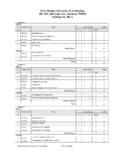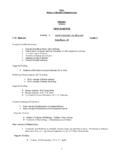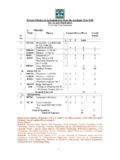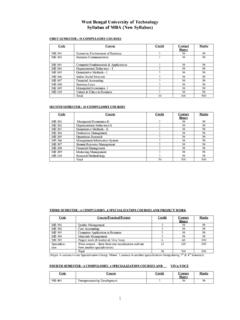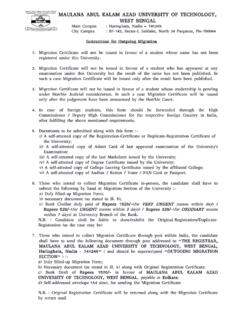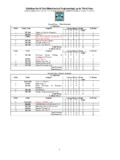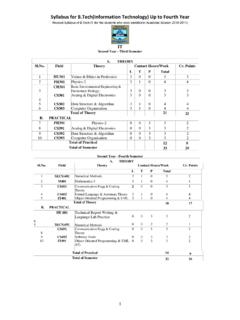Transcription of Syllabus for B.Tech(Food Technology)
1 Syllabus for ( food technology ) Revised Syllabus of FT(for the students who were admitted in Academic Session 2010-2011) 1 2nd Year, 3rd SEMESTER : Code Subjects Contacts (Periods/ week) Credit points L T P Total 1 HU301 Values and ethics in profession 3 0 0 3 3 2 CH(FT)302 Chemistry-2 3 1 0 4 4 3 CH(FT)301 Basic Environmental Engineering & Elementary Biology 3 0 0 3 3 4 FT301 Thermodynamics & Kinetics 3 1 0 4 4 5 FT302 food Microbiology 3 1 0 4 4 6 FT303 Chemistry of food 3 1 0 4 4 Total Theory 22 22 : Code Subjects Contacts (Periods/ week) Credit points L T P Total 1 CH(FT)392 Chemistry-2 Lab 0 0 3 3 2 2 CH391 Environmental Engineering Lab 0 0 3 3 2 3 FT391 Chemistry of food Lab I 0 0 3 3 2 4 FT392 food Microbiology Lab 0 0 3 3 2 Total practical 12 8 Total 3rd Semester 34 30 2nd Year: 4th SEMESTER A: THEORY: Code Subjects Contacts (Periods/ week) Credit points L T P Total 1 M(CS) 401 Numerical Methods 2 1 0 3 2 2 FT 401 Biochemistry & Nutrition 3 1 0 4 4 3 CH 401 Industrial Stoichiometry 3 1 0 4 4 4 FT 402 Principles of food Preservation 3 1 0 4 4 5 CHE 414 Unit Operation of Chemical Engineering-1 3 1 0 4 4 Total Theory 19 18.
2 Code Subjects Contacts (Periods/ week) Credit points L T P Total 1 FT 491 Biochemistry Lab 0 0 3 3 2 2 FT 492 Chemistry of food Lab - II 0 0 3 3 2 3 CHE 484 Unit operation Lab - I 0 0 3 3 2 4 M(CS) 491 Numerical methods lab 0 0 2 2 1 5 HU 481 Technical Report Writing & Language Lab Practice 0 0 3 3 2 Total practical 14 9 Total 4th semester 33 27 Syllabus for ( food technology ) Revised Syllabus of FT(for the students who were admitted in Academic Session 2010-2011) 23rd Year, 5th SEMESTER : Sl. no. Field Code Subjects Contact hours/week Credit points L T P Total 1 HU HU501 Economics of engineering 3 0 0 3 3 2 PC FT 501 food process technology I (cereals, fruits, vegetables, beverages) 3 1 0 4 4 3 PC FT 502 food process technology II (fish, meat, poultry) 3 1 0 4 4 4 PC FT 503 food process engineering 3 1 0 4 4 5 FE CHE 514 Unit operations of chemical engineering II 3 1 0 4 4 Total Theory 19 19 : Sl.
3 No. Field Code Subjects Contact hours/week Credit points L T P Total 1 PC FT 591 food processing lab I 0 0 4 4 2 2 PC FT 592 food analysis & quality control lab 0 0 4 4 3 3 FE CHE 584 Unit operation lab II 0 0 4 4 3 Total practical 12 8 Total 5th Semester 31 27 3rd Year: 6th SEMESTER A: THEORY: : Sl. no. Field Code Subjects Contact hours/week Credit points L T P Total 1 PC FT 691 food processing lab II 0 0 3 3 2 2 PC FT 692 Microbial technology lab 0 0 4 4 2 3 PE CS 685 Data structure & algorithm lab 0 0 3 3 2 4 FT 693 Seminar 0 0 3 3 2 Total practical 13 8 Total 6th semester 33 27 Sl. no. Field Code Subjects Contact hours/week Credit points L T P Total 1 HU HU 601 Principles of management 2 0 0 2 2 2 PC FT 601 food process technology III (milk and milk products) 3 1 0 4 4 3 PC FT 602 food process technology IV (edible fats and oils) 3 0 0 3 3 4 PC FT 603 Bakery, confectionary and extruded foods 3 0 0 3 3 5 PE FT 604 Microbial technology & food biotechnology 3 1 0 4 4 6 FE CS 615 Data structure and algorithm 3 1 0 4 3 Total Theory 20 19 Syllabus for ( food technology ) Revised Syllabus of FT(for the students who were admitted in Academic Session 2010-2011) 34th Year, 7th SEMESTER : Sl.
4 No. Field Code Subjects Contact hours/week Credit points L T P Total 1 PC FT 701 food Packaging technology 3 0 0 3 3 2 PC FT 702 Waste Management of food Industries 3 1 0 4 4 3 PE FT 703 (A/B/C) Elective I (Enzyme technology / Renewable Energy technology / Plant Maintenance, Safety & Hygiene) 3 0 0 3 3 4 PE FT 704 (A/B/C) Elective II (Modeling & Simulation of food Processes / Protein technology / Quality Control & Management) 3 0 0 3 3 5 FE ET 701 Process Instrumentation and Control 3 1 0 4 4 Total Theory 17 17 B. PRACTICAL & SESSIONAL: Sl. no. Field Code Subjects Contact hours/week Credit points L T P Total 1 HU HU 781 Group Discussion 0 0 3 3 2 2 PC FT 791 food Engineering lab 0 0 3 3 2 3 PE FT 792 Report and Seminar on Industrial Training - - - - 2 4 FE ET 791 Instrumentation & Control Lab 0 0 3 3 2 5 Sessional FT 793 Project part 1 0 0 6 6 4 Total practical and sessional 15 12 Total 5th Semester 32 29 4th Year: 8th SEMESTER A.
5 THEORY: B. PRACTICAL & SESSIONAL: Sl. no. Field Code Subjects Contact hours/week Credit points L T P Total 1 Sessional FT 891 Project part 2 0 0 12 12 8 2 Practical FT 892 Product Development & Quality Assurance Lab 0 0 6 6 4 3 Sessional FT 893 Grand Viva - - - - 3 Total sessional 18 15 Total 6th semester 26 23 Sl. no. Field Code Subjects Contact hours/week Credit points L T P Total 1 HU HU 801A Organizational Behavior 2 0 0 2 2 2 PE FT 801 Project Engineering & food Plant Layout 3 0 0 3 3 3 FE FT 802 (A/B/C) Elective III (Principles of Biochemical Engineering / Entrepreneurship Development for food Technologists / Functional Foods & Nutraceuticals) 3 0 0 3 3 Total Theory 8 8 Syllabus for ( food technology ) Revised Syllabus of FT(for the students who were admitted in Academic Session 2010-2011) 4 Semester III Theory VALUES & ETHICS IN PROFESSION HU 301 Contracts: 3L Credits- 3 Science, technology and Engineering as knowledge and as Social and Professional Activities Effects of Technological Growth.
6 Rapid Technological growth and depletion of resources, Reports of the Club of Rome. Limits of growth: sustainable development Energy Crisis: Renewable Energy Resources Environmental degradation and pollution. Eco-friendly Technologies. Environmental Regulations, Environmental Ethics Appropriate technology Movement of Schumacher; later developments technology and developing notions. Problems of technology transfer, technology assessment impact analysis. Human Operator in Engineering projects and industries. Problems of man, machine, interaction, Impact of assembly line and automation. Human centered technology . Ethics of Profession: Engineering profession: Ethical issues in Engineering practice, Conflicts between business demands and professional ideals. Social and ethical responsibilities of Technologists. Codes of professional ethics.
7 Whistle blowing and beyond, Case studies. Profession and Human Values: Values Crisis in contemporary society Nature of values: Value Spectrum of a good life Psychological values: Integrated personality; mental health Societal values: The modern search for a good society, justice, democracy, secularism, rule of law, values in Indian Constitution. Aesthetic values: Perception and enjoyment of beauty, simplicity, clarity Moral and ethical values: Nature of moral judgements; canons of ethics; ethics of virtue; ethics of duty; ethics of responsibility. Books: 1. Stephen H Unger, Controlling technology : Ethics and the Responsible Engineers, John Wiley & Sons, New York 1994 (2nd Ed) 2. Deborah Johnson, Ethical Issues in Engineering, Prentice Hall, Englewood Cliffs, New Jersey 1991. 3. A N Tripathi, Human values in the Engineering Profession, Monograph published by IIM, Calcutta 1996.
8 CHEMISTRY-2 CH(FT) 302 Contracts: 3L + 1T Credits- 4 Module I: Dilute solutions Colligative properties Lowering of vapor pressure of solution, elevation of boiling point, freezing point depression, definition, principles, and laws of osmotic pressure Syllabus for ( food technology ) Revised Syllabus of FT(for the students who were admitted in Academic Session 2010-2011) 5 Ionic equilibrium: Solubility and solubility product, common ion effect, determination of solubility product by EMF method, ionic product of water, pH, pOH, hydrolysis of salt solutions: Strong acid and weak base, weak acid and strong base, weak acid and weak base, concepts of buffer Module II: Instrumental methods of spectral analyses UV Spectra: Electronic transition ( - *, n- *, - * and n- *), steric effect, solvent effect, hyperchromic effect, hypochromic effect (typical examples).
9 IR Spectra: Modes of molecular vibrations, characteristic stretching frequencies of O-H, C-H, C=C, C=O functions NMR Spectra: Nuclear spin, NMR active nuclei, principle of proton magnetic resonance, equivalent and non-equivalent protons Photochemistry: Lambert s law and Beer s Law, Laws of photochemistry, Photochemical processes Module III: Coordination chemistry Structures of coordination compounds corresponding to coordination number 6; types of ligands; isomerism (geometrical, optical, ionization, linkage and coordination) Colloid chemistry: Definition of colloid, principle of colloid formation, types of colloid, colloid preparation, stability of colloid, association of colloid and emulsion Module IV: General treatment of reaction mechanisms: Ionic and radical reactions; heterolytic and, homolytic bond cleavage; Reactive intermediates: carbocations (cabenium and carbonium ions), carbanions, carbon radicals, carbenes structure using orbital picture, electrophilic/nucleophilic behaviour, stability, generation and fate.
10 Reaction kinetics: transition state theory, rate const and free energy of activation, free energy profiles for one step and two step reactions Nucleophilic substitution reactions: SN1, SN2, SNi mechanisms. Effect of substrate structure, nucleophiles and medium on reactivity and mechanism; neighboring group participations. Elimination Reactions: E1, E2, and E1cB mechanisms. Saytzeff and Hofmann rules. Elimination vs substitution reaction. Electrophilic and Activated Nucleophilic substitution reactions of Benzene ( Nitration, sulphonation, Halogenation and Friedel Craft reactions) BASIC ENVIRONMENTAL ENGINEERING & EELMENTARY BIOOLOGY CH(FT) 301 L-T-P = 3-0-0 At least 30 Hrs/Sem Introduction: Basic ideas of environment, basic concepts, man, society & environment, their interrelationship.
